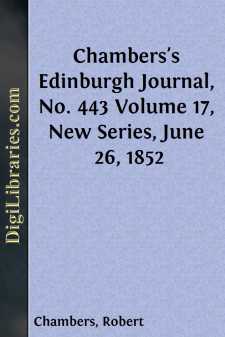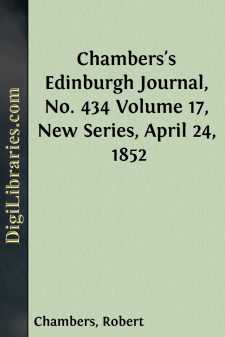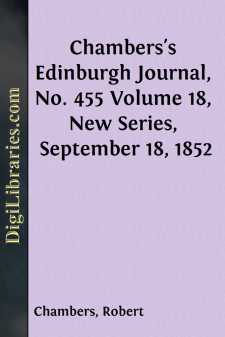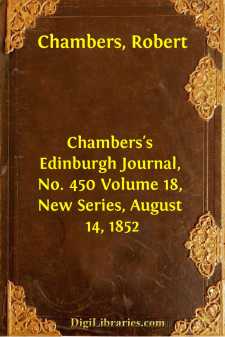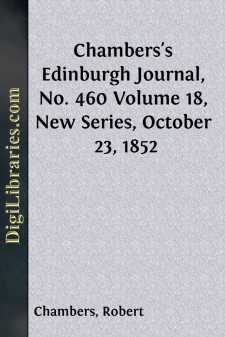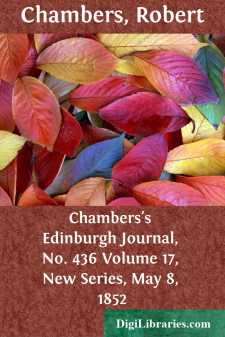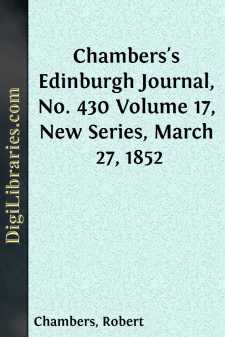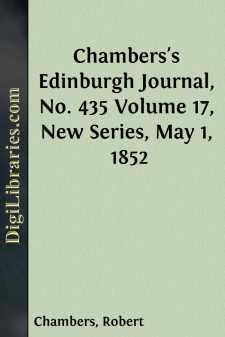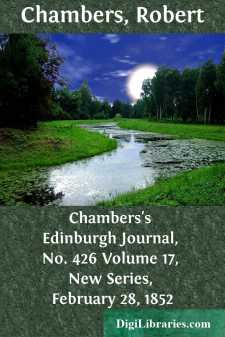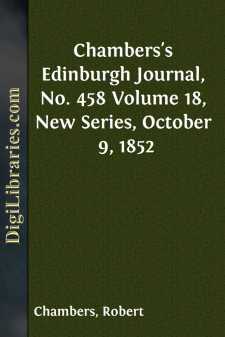Categories
- Antiques & Collectibles 13
- Architecture 36
- Art 48
- Bibles 22
- Biography & Autobiography 813
- Body, Mind & Spirit 142
- Business & Economics 28
- Children's Books 15
- Children's Fiction 12
- Computers 4
- Cooking 94
- Crafts & Hobbies 4
- Drama 346
- Education 46
- Family & Relationships 57
- Fiction 11828
- Games 19
- Gardening 17
- Health & Fitness 34
- History 1377
- House & Home 1
- Humor 147
- Juvenile Fiction 1873
- Juvenile Nonfiction 202
- Language Arts & Disciplines 88
- Law 16
- Literary Collections 686
- Literary Criticism 179
- Mathematics 13
- Medical 41
- Music 40
- Nature 179
- Non-Classifiable 1768
- Performing Arts 7
- Periodicals 1453
- Philosophy 64
- Photography 2
- Poetry 896
- Political Science 203
- Psychology 42
- Reference 154
- Religion 513
- Science 126
- Self-Help 84
- Social Science 81
- Sports & Recreation 34
- Study Aids 3
- Technology & Engineering 59
- Transportation 23
- Travel 463
- True Crime 29
Chambers's Edinburgh Journal, No. 443 Volume 17, New Series, June 26, 1852
by: Robert Chambers
Description:
Excerpt
PROSAIC SPIRIT OF THE AGE.
There are some phrases that convey only a vague and indefinite meaning, that make an impression upon the mind so faint as to be scarcely resolvable into shape or character. Being associated, however, with the feeling of beauty or enjoyment, they are ever on our lips, and pass current in conversation at a conventional value. Of these phrases is the 'poetry of life'—words that never fail to excite an agreeable though dreamy emotion, which it is impossible to refer to any positive ideas. They are generally used, however, to indicate something gone by. The poetry of life, we say, with sentimental regret, has passed away with the old forms of society; the world is disenchanted of its talismans; we have awakened from the dreams that once lent a charm to existence, and we now see nothing around us but the cold hard crust of external nature.
This must be true if we think it is so; for we cannot be mistaken, when we feel that the element of the poetical is wanting in our constitutions. But we err both in our mode of accounting for the fact, and in believing the loss we deplore to be irretrievable. The fault committed by reasoners on this subject is, to confound one thing with another—to account for the age being unpoetical—as it unquestionably is—by a supposed decay in the materials of poetry. We may as well be told that the phenomena of the rising and setting sun—of clouds and moonlight—of storm and calm—of the changing seasons—of the infinitely varying face of nature, are now trite and worn-out. They are as fresh and new as ever, and will be so at the last day of the world, presenting, at every recurring view, something to surprise as well as delight. To each successive generation of men, the phenomena both of the outer and inner world are absolutely new; and the child of the present day is as much a stranger upon the earth as the first-born of Eve. But the impression received by each individual from the things that surround him is widely different—as different as the faces in a crowd, which all present the common type of humanity without a single feature being alike. This fact we unconsciously assert in our everyday criticism; for when any similarity is detected in a description, whether of things internal or external, we at once stigmatise the later version as a plagiarism, and as such set it down as a confession of weakness.
But although the manifestations of nature, being infinite, cannot be worn out, the capacity to enjoy them, being human, may decay. It may, in fact, in some natures, be entirely wanting, and in some generations at least partially so. Seamen, for instance, who live, move, and have their being in a world of poetry and romance, are the least poetical of men; even in their songs they affect the prosaic and matter of fact, and discard everything appertaining to the fanciful. Here is a direct instance of the materials of poetry being present, and its spirit wanting. So common, however, is it to confound the poetical with the faculty of enjoying it, that we find a hygienic power ascribed as an absolute property to the beauty of that very element, from which they who view it, both in its sweetest and grandest aspects, derive no elevation of feeling whatever....


